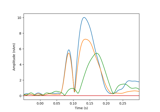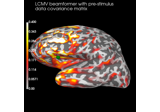mne.cov.regularize¶
- mne.cov.regularize(cov, info, mag=0.1, grad=0.1, eeg=0.1, exclude='bads', proj=True, seeg=0.1, ecog=0.1, hbo=0.1, hbr=0.1, fnirs_cw_amplitude=0.1, fnirs_fd_ac_amplitude=0.1, fnirs_fd_phase=0.1, fnirs_od=0.1, csd=0.1, dbs=0.1, rank=None, scalings=None, verbose=None)[source]¶
Regularize noise covariance matrix.
This method works by adding a constant to the diagonal for each channel type separately. Special care is taken to keep the rank of the data constant.
Note
This function is kept for reasons of backward-compatibility. Please consider explicitly using the
methodparameter inmne.compute_covariance()to directly combine estimation with regularization in a data-driven fashion. See the faq for more information.- Parameters
- cov
Covariance The noise covariance matrix.
- info
dict The measurement info (used to get channel types and bad channels).
- mag
float(default 0.1) Regularization factor for MEG magnetometers.
- grad
float(default 0.1) Regularization factor for MEG gradiometers. Must be the same as
magif data have been processed with SSS.- eeg
float(default 0.1) Regularization factor for EEG.
- exclude
list| ‘bads’ (default ‘bads’) List of channels to mark as bad. If ‘bads’, bads channels are extracted from both info[‘bads’] and cov[‘bads’].
- projbool (default
True) Apply projections to keep rank of data.
- seeg
float(default 0.1) Regularization factor for sEEG signals.
- ecog
float(default 0.1) Regularization factor for ECoG signals.
- hbo
float(default 0.1) Regularization factor for HBO signals.
- hbr
float(default 0.1) Regularization factor for HBR signals.
- fnirs_cw_amplitude
float(default 0.1) Regularization factor for fNIRS CW raw signals.
- fnirs_fd_ac_amplitude
float(default 0.1) Regularization factor for fNIRS FD AC raw signals.
- fnirs_fd_phase
float(default 0.1) Regularization factor for fNIRS raw phase signals.
- fnirs_od
float(default 0.1) Regularization factor for fNIRS optical density signals.
- csd
float(default 0.1) Regularization factor for EEG-CSD signals.
- dbs
float(default 0.1) Regularization factor for DBS signals.
- rank
None| ‘info’ | ‘full’ |dict This controls the rank computation that can be read from the measurement info or estimated from the data. When a noise covariance is used for whitening, this should reflect the rank of that covariance, otherwise amplification of noise components can occur in whitening (e.g., often during source localization).
NoneThe rank will be estimated from the data after proper scaling of different channel types.
'info'The rank is inferred from
info. If data have been processed with Maxwell filtering, the Maxwell filtering header is used. Otherwise, the channel counts themselves are used. In both cases, the number of projectors is subtracted from the (effective) number of channels in the data. For example, if Maxwell filtering reduces the rank to 68, with two projectors the returned value will be 66.'full'The rank is assumed to be full, i.e. equal to the number of good channels. If a
Covarianceis passed, this can make sense if it has been (possibly improperly) regularized without taking into account the true data rank.dictCalculate the rank only for a subset of channel types, and explicitly specify the rank for the remaining channel types. This can be extremely useful if you already know the rank of (part of) your data, for instance in case you have calculated it earlier.
This parameter must be a dictionary whose keys correspond to channel types in the data (e.g.
'meg','mag','grad','eeg'), and whose values are integers representing the respective ranks. For example,{'mag': 90, 'eeg': 45}will assume a rank of90and45for magnetometer data and EEG data, respectively.The ranks for all channel types present in the data, but not specified in the dictionary will be estimated empirically. That is, if you passed a dataset containing magnetometer, gradiometer, and EEG data together with the dictionary from the previous example, only the gradiometer rank would be determined, while the specified magnetometer and EEG ranks would be taken for granted.
The default is
None.New in version 0.17.
New in version 0.18: Support for ‘info’ mode.
- scalings
dict|None Data will be rescaled before rank estimation to improve accuracy. See
mne.compute_covariance().New in version 0.17.
- verbosebool,
str,int, orNone If not None, override default verbose level (see
mne.verbose()and Logging documentation for more). If used, it should be passed as a keyword-argument only.
- cov
- Returns
- reg_cov
Covariance The regularized covariance matrix.
- reg_cov
See also

